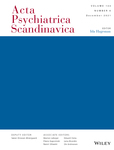Risk of Dementia After Electroconvulsive Therapy: A Cohort Study on the Population of Wales
Abstract
Background
Electroconvulsive therapy (ECT) is the most effective therapy for severe or treatment-resistant depression. A common short-term side effect is memory problems, and it is important to know whether ECT increases the risk for dementia later in life. Major psychiatric disorders are associated with an increased risk for developing dementia, making the analysis of dementia risk challenging. A small number of previous studies indicate that ECT does not increase this risk. We wanted to examine the association between ECT and subsequent risk of dementia in the population of Wales, UK.
Methods
We analysed the electronic health records of the Welsh population. We selected 110,774 people aged between 35 and 65 on 1.1.1995 who had no prior diagnosis of dementia and had been hospitalised with diagnoses of affective disorders. Of those, 1010 received at least one course of ECT between 1995 and 2024 before a diagnosis of dementia.
Results
The 110,774 persons were followed up until the end of the study period in 2024, or the date of dementia diagnosis, or the date of death, for a mean of 24.5 (SD = 6.3) years. 15.4% of the ECT group developed dementia, compared to 13.1% for the non-ECT-treated individuals. After controlling for age, sex, social deprivation status, physical comorbidities, history of alcohol abuse, the number of psychiatric hospitalisations and the age when they first occurred, the hazard ratio for dementia was not increased in the ECT group: HR = 0.888, 95% CI: 0.757–1.044, p = 0.15.
Conclusions
Though crude analyses found a greater risk of dementia among those receiving ECT, once confounders were accounted for, we failed to find a statistically significant risk for dementia among those who received ECT. Our findings strengthen the conclusions of previous reports and provide further reassurance for people considering this treatment.


 求助内容:
求助内容: 应助结果提醒方式:
应助结果提醒方式:


